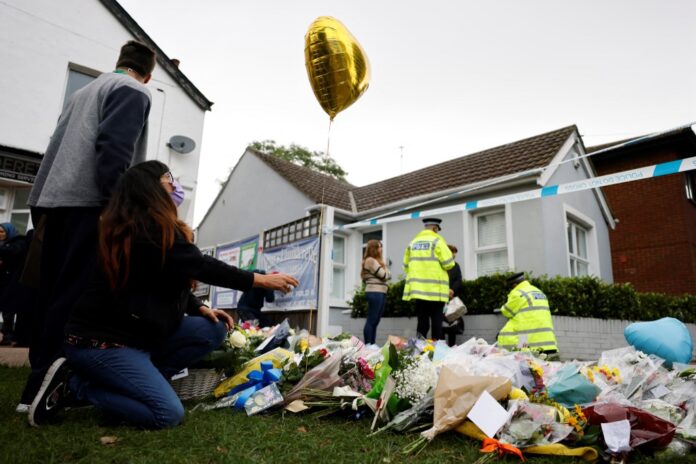Well-wishers lay floral tributes at the scene of the fatal stabbing of Conservative British lawmaker David Amess, at Belfairs Methodist Church in Leigh-on-Sea, a district of Southend-on-Sea, in southeast England on October 16, 2021. — AFP pic
LEIGH-ON-SEA, Oct 17 — The attacker who fatally stabbed British lawmaker David Amess was referred to a official counter-terrorist scheme for those thought to be at risk of radicalisation, according to media reports.
Police said late yesterday that detectives had until Friday, October 22, to question the suspect after he was detained under the Terrorism Act, which allowed them to extend his detention.
Veteran Conservative MP David Amess, 69, was talking with voters at a church in the small town of Leigh-on-Sea east of London when he was stabbed to death on Friday.
Police have said they are investigating “a potential motivation linked to Islamist extremism”. The investigation is being led by Scotland Yard’s Counter Terrorism Command.
The BBC said it had received confirmation from Whitehall officials that the man’s name is Ali Harbi Ali.
Ali, a British citizen of Somali heritage, had been referred to Prevent, the UK’s scheme for those thought at risk of radicalisation a few years ago, the BBC reported.
‘Fast-paced investigation’
Ali is believed not have spent long on the programme, which is voluntary in nature, and was never formally a “subject of interest” to MI5, the domestic security agency, said the BBC.
Police and security services believe the attacker acted alone and was “self-radicalised”, The Sunday Times reported, while he may have been inspired by Al-Shabaab, Al-Qaeda-linked Islamists in Somalia.
Ali’s father Harbi Ali Kullane, a former adviser to the prime minister of Somalia, confirmed to The Sunday Times that his son was in custody, adding: “I’m feeling very traumatised.”
Police said they have been carrying out searches at three addresses in the London area in a “fast-paced investigation”.
The Sun tabloid reported that the attacker stabbed Amess multiple times in the presence of two women staff, before sitting down and waiting for police to arrive.
The Daily Mail newspaper reported that he had booked an appointment a week ahead.
Candle-lit vigil
On Saturday evening, hundreds of mourners attended a candle-lit vigil at a sports field near the scene of the crime, holding a minute’s silence in the MP’s memory.
Prime Minister Boris Johnson earlier visited the crime scene to pay his respects on Saturday, laying floral wreaths outside the church with the leader of the opposition, Labour leader Keir Starmer in a rare show of unity.
Local residents including members of the Muslim community also heaped bouquets next to the police tape.
Britain’s politicians were stunned by the highly public attack, which recalled the murder of a pro-EU lawmaker ahead of the Brexit referendum.
In June 2016, Labour MP Jo Cox was killed by a far-right extremist, prompting demands for action against what lawmakers said was “a rising tide” of public abuse and threats against elected representatives.
Home Secretary Priti Patel on Friday ordered police across the country to review security arrangements for all 650 MPs and The Sunday Times reported that every MP could be granted security protection when meeting the public.
‘Cannot be cowed’
“We will carry on… We live in an open society, a democracy. We cannot be cowed by any individual,” Patel told journalists after laying a wreath for her fellow Essex MP.
Tobias Ellwood, a Conservative MP who tried to save a stabbed police officer during a 2017 terror attack near the Houses of Parliament, on Twitter urged “a temporary pause in surgeries, or face-to-face meetings with constituents, until the security review is complete.
House of Commons Speaker Lindsay Hoyle in The Observer wrote that “we need to take stock” and review whether security measures introduced after Cox’s murder are “adequate to safeguard members, staff and constituents, especially during surgeries”.
Increasing threats
MPs and their staff have been attacked before, although it is rare.
But their safety was thrown into sharp focus by Brexit, which stoked deep political divisions and has led to often angry, partisan rhetoric.
Cox’s killer repeatedly shouted “Britain first” before shooting and stabbing the 41-year-old MP outside her constituency meeting near Leeds, northern England.
Amess was at the other end of the political spectrum and backed Brexit.
A specialist police unit set up to investigate threats against MPs in the aftermath of Cox’s murder said 678 crimes against lawmakers were reported between 2016 and 2020.
Amess himself wrote about public harassment and online abuse in his book “Ayes & Ears: A Survivor’s Guide to Westminster”, published last year.
“These increasing attacks have rather spoilt the great British tradition of the people openly meeting their elected politicians,” he said.
MPs have had to install security cameras and only meet constituents by appointment, he added.
Unlike some MPs, Amess publicised meeting times for constituents on Twitter and held them in public places, while asking people to book ahead. — AFP


